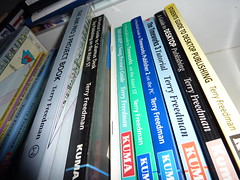My blackberry isn’t working: technology and language
Some of my reference books
 Just because I love technology and spend a lot of time on the web, and writing for the web, doesn’t mean I’ve eschewed books. I still use books extensively (and intensively) for my writing. Not any books either, but ones written or contributed to by experts.
Just because I love technology and spend a lot of time on the web, and writing for the web, doesn’t mean I’ve eschewed books. I still use books extensively (and intensively) for my writing. Not any books either, but ones written or contributed to by experts.
I think if you’re serious about writing you don’t want to be messing about with so-called “crowd-sourced” information, which may or may not be correct.
The basic rule of blog headlines
Brevity definitely IS the soul of wit
This afternoon I found myself in an emotionally challenging superfluous text situation. In other words, I became somewhat “wound up” by having to waste my time reading a long-winded sentence that was clearly designed to demonstrate the erudition of the writer rather than facilitate the understanding of the reader.
More on self-publishing
Top tips from a self-publisher
Language as a window into human nature
Integrity, journalism and PR
 I attended a very interesting Westminster Media Forum seminar recently on the subject of journalism and public relations (PR). I thought I’d write about these issues in relation to integrity in blogging. It's an article that has been developing in my mind for some weeks now, and the seminar has helped me to put a few of my thoughts in order.
I attended a very interesting Westminster Media Forum seminar recently on the subject of journalism and public relations (PR). I thought I’d write about these issues in relation to integrity in blogging. It's an article that has been developing in my mind for some weeks now, and the seminar has helped me to put a few of my thoughts in order.
Good news: you can succeed as a bad writer, apparently
Bad headlines
If there’s one thing that really annoys me it’s chapter headings and article headlines where you can’t tell what the subject matter is until you read it. Who needs a situation in which you don’t know if you want to read something until you have read it? The way I look at it is that if the author can’t even be bothered being clear when he’s trying to entice you to read his stuff, why should you be bothered to oblige him by reading it?
4 Reasons to get published
 It's important to be published by a traditional publisher
It's important to be published by a traditional publisher
Image by Terry Freedman via Flickr
In this day and age, in which anyone can publish and distribute their books electronically, or self-publish them by going down several routes (none of which need include the traditional vanity publisher), why should anyone bother approaching a traditional publisher? After all, very few of the thousands of manuscripts that publishers receive find their way into book form, and of those that do, very few hit the big time. There are, in fact, at least 4 reasons to try to get published by the age-old process of going to publishers.
How to find all articles in a series quickly
10 attributes of professional writers -- #10: Ask for permission to quote
 It’s always a good idea to ask permission to quote someone, especially if you’re (slightly) putting words into their mouths. “How might that arise?”, you might ask.
It’s always a good idea to ask permission to quote someone, especially if you’re (slightly) putting words into their mouths. “How might that arise?”, you might ask.
10 attributes of professional writers -- #9: Keep a record of sources
 If you’re doing research for an article, it’s easy to lose track of where you came across information, such as useful quotes you can use. This is where an electronic aide can come in very handy.
If you’re doing research for an article, it’s easy to lose track of where you came across information, such as useful quotes you can use. This is where an electronic aide can come in very handy.
Two tools you might consider using are:
10 attributes of professional writers -- #8: Pitch to the right outlet
10 attributes of professional writers -- #7: Research properly
 Can there be any excuse, in this day and age, for poorly-researched material? There are books, the internet and still, even in these straitened times, public libraries with reference sections.
Can there be any excuse, in this day and age, for poorly-researched material? There are books, the internet and still, even in these straitened times, public libraries with reference sections.
Self-publishing
 Although I have had many books published by traditional publishers, I like self-publishing. I like it because it is great for niche topics. However, it is most decidedly not an unequivocally good thing, and there are pros and cons of each approach. This video summarises the issues.
Although I have had many books published by traditional publishers, I like self-publishing. I like it because it is great for niche topics. However, it is most decidedly not an unequivocally good thing, and there are pros and cons of each approach. This video summarises the issues.
10 attributes of professional writers -- #6: Proofread properly
Last year a teenager sent me an article with a covering email saying:
Sorry, I didn’t have time to proofread it properly. Sure you can sort it out!
